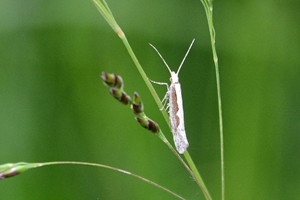 With vast numbers of diamondback moths being recorded in areas of the UK this week, the Game & Wildlife Conservation Trust is reminding gamekeepers and landowners to keep a close eye on game cover crops and wildlife seed mixes in order to minimise any potential damage.
With vast numbers of diamondback moths being recorded in areas of the UK this week, the Game & Wildlife Conservation Trust is reminding gamekeepers and landowners to keep a close eye on game cover crops and wildlife seed mixes in order to minimise any potential damage.
Peter Thompson, Biodiversity Advisor at the GWCT, explains: “Under the Countryside Stewardship scheme’s wild bird seed mixture option it is worth remembering that the required seed mix of a minimum of three plant species is quite likely to have included at least one brassica. The food plant of diamondback moth larvae is brassicas of all sorts, and if this element of the mix is destroyed by the caterpillars then you may well be in breach of the scheme’s requirements.”
“I would therefore recommend employing the services of a qualified agronomist, who will assess any likely damage and potentially recommend a spray to control the pest. Only with this professional advice can spraying can be undertaken, with no extra need to have permission of Natural England. Despite their minute size, in large numbers these moths can create havoc, so I would suggest anyone who is concerned should seek advice.”
These insects travel to UK shores from Europe. Good breeding conditions coupled with perfect weather have led to hundreds of thousands recently being recorded. The moths normally start to arrive in June, but not on the huge scale that is being witnessed this year. Once here, they can have several broods during the summer.
Notes to editors
The Game & Wildlife Conservation Trust – providing research-led conservation for a thriving countryside. The GWCT is an independent wildlife conservation charity which has carried out scientific research into Britain’s game and wildlife since the 1930s. We advise farmers and landowners on improving wildlife habitats. We employ more than 60 post-doctoral scientists and other research staff with expertise in areas such as birds, insects, mammals, farming, fish and statistics. We undertake our own research as well as projects funded by contract and grant-aid from government and private bodies.
For information, contact:
Eleanor Williams
Telephone: 07592 025476
Email: press@gwct.org.uk